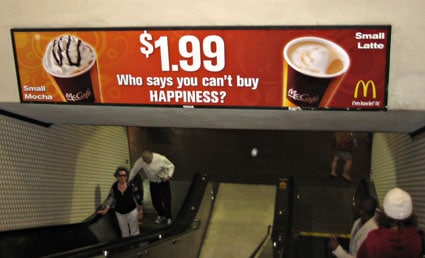Yesterday’s NYT article about Ford using personas raised one of my big concerns about the process, where a design process artifact becomes (inappropriately) a marketing artifact.
The designers imagined her life in detail in a video, “A Day in the Life of Natasha.” Several human models were screen-tested before one, who looks vaguely like Audrey Hepburn, was chosen to appear in the video. The video was also convenient for explaining the car to the press and public.
Here’s an egregious example of persona-think gone mad: In the “Intel Process Personalities” contest, they put forth a number of personas

 and asked online readers “What kind of PC junkie are you?” and “What superhero powers would your ideal notebook PC have?” People submitted their answers online and a six were chosen to be profiled in followup advertising. Here’s one:
and asked online readers “What kind of PC junkie are you?” and “What superhero powers would your ideal notebook PC have?” People submitted their answers online and a six were chosen to be profiled in followup advertising. Here’s one:




Five other real people are similarly profiled in the 3-page ad.
It’s just disturbing to see corporations decide that there are 6 mutually exclusive customer types and ask people then to identify themselves as a Frequent Flyer, a Cafe King, or (yecccchhhh) The Multimedia Monkey. I don’t aspire to be any of those characters. While I may have a set of needs, behaviors, and preferences that align me with other folks, it’s audacious of the company to set up categories and ask me to fit myself into them. And when it’s as ham-fistedly awkward as this (i.e., The Blogger is involved in “posting timely twitters updates”) it’s even more insulting.
Now, this is marketing, not user research, but it’s bringing in user research as semiotics in a way that devalues the real work of researchers and participants. “What superhero powers would your ideal notebook PC have?” is a great question in participatory design, but smug as part of a contest.
Kudos to Intel to using real people in these profiles (admittedly, I assumed they were fake until I read the fine print) but shame on Intel for exposing their patronizing “segmentation” and offering goods in exchange for people identifying themselves within those caricatures.
For more anti-persona ranting, we’re happy to pass along the now-classic interactions column Persona Non Grata upon request.



 and asked online readers “What kind of PC junkie are you?” and “What superhero powers would your ideal notebook PC have?” People submitted their answers online and a six were chosen to be profiled in followup advertising. Here’s one:
and asked online readers “What kind of PC junkie are you?” and “What superhero powers would your ideal notebook PC have?” People submitted their answers online and a six were chosen to be profiled in followup advertising. Here’s one:







